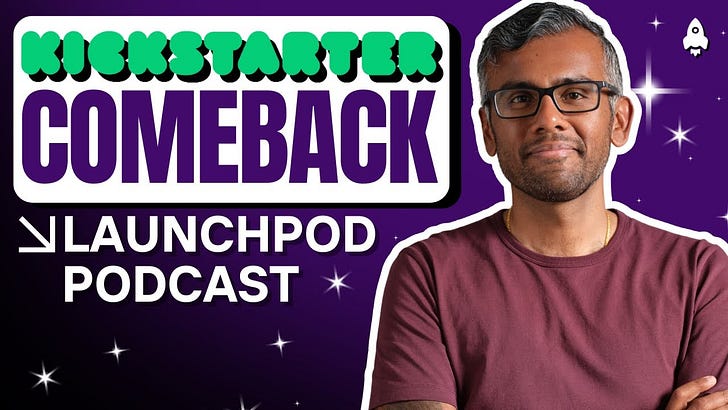Kickstarter had what every company dreams of: viral adoption, “insane PMF,” and growth that one board member described as “printing money.”
But after years of success, the company hit a wall.
“We stopped listening to customers for about five or six years. We became ultra-successful. And then competition cropped up, and creators started to lose faith in us.”
Mahesh Guruswamy, Kickstarter’s Chief Product & Technology Officer, joined us on this week’s episode of LaunchPod to share the inside story of the company’s turnaround and the leadership lessons that came with it.
From insane PMF to painful plateau
Kickstarter had a dominant position in the campaign phase of crowdfunding. But for years, they stuck to a strict rule: stay out of the post-campaign space.
That dogma left creators on their own to manage shipping, taxes, and fulfillment, which opened the door for competitors to help them.
“At first it was symbiotic. They helped creators fulfill their campaigns. But eventually they started doing crowdfunding themselves.”
For Mahesh and CEO Everett Taylor, the fix started with humility.
“We needed to eat humble pie and go back to the drawing board. Listen to creators and give them what they need.”
That meant changing Kickstarter’s stance.
“We're now building all aspects of the creator journey. The campaign. The post-campaign. All of it, in one platform.”
And it’s working…even if creators push back a bit. As Mahesh explained the feedback, “we've been asking for it for five plus years, but great that you gave it to us now.”
A competitive fire Kickstarter hadn’t felt in years
Internally, not everyone was on board with this new posture. Kickstarter had never thought of itself as a competitive company.
“There was a lot of resistance to being so competitive. But we were very transparent with our teams about the financials and the competition.”
Mahesh reframed it for those who struggled with external pressure.
“If you can't be competitive with the outside world, be competitive with yourself. Be a better team than we were six months ago.”
They prioritized their most valuable customers, creators and backers with the highest revenue impact, and uncovered pain points others overlooked.
Taxes, for instance.
“No one wants to solve taxes. But it’s a huge source of risk for creators and backers.”
Kickstarter partnered with Avalara and built tools to correctly calculate taxes across regions. At first, backers pushed back. But creators helped educate them.
“This is like a Stripe-level problem. Solving it helps people stay with us. And creators explaining the benefits to their backers? That’s really powerful.”
The hidden superpower: the Kickstarter community
Kickstarter has one of the strongest communities in tech, and Mahesh sees that as a key part of the turnaround.
“Some campaigns get 60% of their backing from the Kickstarter network [not the creator’s audience]. That’s the backer community in action.”
They’re working to personalize the backer experience and convert one-time supporters into lifelong advocates.
“A backer is considered engaged not just when they pledge, but when they receive their reward. That’s the real moment.”
And when it comes to growth, Mahesh reminds us that the answers are usually already there, if you’re willing to listen.
“We thought about Blue Ocean strategy and the innovator's dilemma. But then we realized, customers are yelling and screaming about things we already don’t do well. Just fix those.”
The team now talks to creators weekly and actively distills feedback, even if the reference point is a competitor’s feature.
“We don’t copy. We solve the underlying problem and create a unified experience only Kickstarter can offer.”
On leadership, writing, and delivering hard news
Before Kickstarter, Mahesh held leadership roles at Amazon, Fidelity, and Smartsheet. But it was a habit from childhood that shaped him most as a leader: writing about hard things.
“I started writing as a way to process things that were emotionally difficult. That turned into frameworks. Eventually, it became a book.”
His book, How to Deliver Bad News and Get Away with It, is about navigating tough conversations, and staying sane in the process.
“Get away with it doesn’t mean tricking people. It means doing it in a way that’s respectful, with evidence, and a path forward.”
Mahesh now writes almost daily, using that habit to reflect on leadership, difficult moments, and the kind of impact he wants to have.
“My legacy is really important to me. I want to be remembered as someone who helped turn Kickstarter around. Who made hard choices and got stuff done.”
Links
LinkedIn: https://www.linkedin.com/in/maheshguruswamy/
Website: https://www.maheshguruswamy.com/
Substack: https://maheshguruswamy.substack.com/
Resources
How to Deliver Bad News and Get Away with It: A Manager's Guide, By Mahesh Guruswamy: https://www.amazon.com/How-Deliver-Bad-News-Away/dp/B0D7FHTTNN
Chapters
00:00 Intro
01:09 Mahesh's Background and Kickstarter Connection
02:08 The Power of Writing and Self-Reflection
04:28 Publishing a Book: How to Deliver Bad News
05:53 Effective Communication and Feedback
06:46 Navigating Tough Conversations
11:03 Kickstarter's Evolution and Challenges
14:16 Listening to Customers and Adapting
19:36 Navigating Market Shifts and Growth
20:34 Prioritizing Customer Feedback
25:59 Building and Engaging the Community
29:54 Competitive Strategies and Organizational Culture
34:05 Leadership and Legacy
37:03 Conclusion and Future Prospects
What does LogRocket do?
LogRocket's Galileo AI watches user sessions for you and surfaces the technical and usability issues holding back your web and mobile apps. Understand where your users are struggling by trying it for free at LogRocket.com











